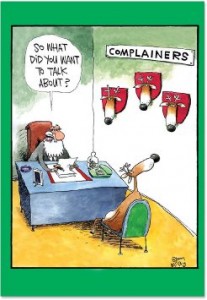You probably saw this on the web this past week, but in case you didn’t a former Harvard University graduate and Emmy award winning writer got rejected for a job at The Container Store for the holidays. She was very surprised by this, in a pompous I’m-really-to-good-for-you kind of way, but I’m desperate, so you would be lucky to have me. Here it is in her words:
“The email from The Container Store asking for holiday help arrived a week before my rescheduled MRI. Of course I applied! You would have, too, if you had one kid paying his own way through college, another applying, no health coverage, a bum boob, a broken marriage and an empty bank account. There is no time for shame in a recession. You do what you have to do. There are worse ways to spend your day than greeting visitors at the front of a store run by a company whose products you actually use. A week later, I got an email from the Manhattan Loss Prevention department at The Container Store. Here’s what it said:
Hello Deborah —
Thank you for your interest in employment opportunities at The Container Store.
We carefully review all applications and consider each person for current or future opportunities. At this time, we are moving forward with other candidates for this position.
Again, we thank you for your interest in The Container Store. We wish you much success in your job search.
Sincerely,
The Container Store
Manhattan Loss Prevention
Reader, first I laughed when I read this. Then I cried. Oh, Reader, I cried and I cried, long and deep and mournfully. I cried for me and my kids, then I cried for everyone else in my same boat, then I cried for everyone in far worse boats. Because seriously, if an Emmy Award-winning, New York Times bestselling author and Harvard grad cannot land a job as a greeter at The Container Store — or anywhere else for that matter, hard as I tried — we are all doomed.“
Really? We are all doomed because someone who has a Harvard degree and can write can’t get a service level holiday job?
Let’s take a look at why she probably didn’t get hired. I’ll give you some possible reasons on why The Container Store decided to go another route:
1. It’s a temporary job for the holidays, where they need someone to greet stressed out holiday shoppers. Many people work these jobs each year to get extra holiday money, they have experience doing this, they can be counted on, not to quit after the first rude person yells at them. Experience counts. Even in ‘crappy’ jobs.
2. These jobs are boring and monotonous. Service level companies know that most Harvard educated folks would be bored and not engaged in these positions.
3. Looking at the application of someone with a Harvard education and being a writer, they might have decided the person would work only until they got a better job, and they wanted to ensure the person stayed on through the completion of the assignment.
4. Maybe they had someone who has worked ‘temporarily’ for them in the past apply to come back, that had previously performed well.
5. Maybe they got internal referrals of friends and family from their employees, and decided those hires might ‘fit’ better.
No doubt Deborah is smart and a good writer. That doesn’t mean she would be good for the container store, and it is pompous of her to believe she would be. She didn’t see this ‘job’ as good, she saw it as a step down, and something she was ‘forced’ to do. Sounds just like someone you really want working for you, right? “Well, I don’t have anything else Container Store, I guess I’ll take your crappy job.”
The Container Store rejected a Harvard graduate because a Harvard graduate isn’t the best hire, the best talent, for the position they were hiring for. I might not be a Harvard graduate, but that seems pretty simple to figure out.





